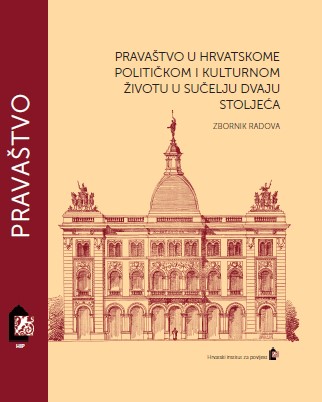Nova država, novi putevi (Predratni dalmatinski pravaši u političkim zbivanjima 1918.–1920. godine)
New state, new paths (Dalmatian prewar ‘Rightists’ in the political developments of 1918–1920)
Author(s): Zdravka Jelaska Marijan
Subject(s): Political history, Government/Political systems, Political behavior, Comparative politics, Pre-WW I & WW I (1900 -1919), Interwar Period (1920 - 1939)
Published by: Hrvatski institut za povijest
Keywords: Dalmatia; ‘Rightists’; the politics of national concentration;
Summary/Abstract: The politics of national concentration in Dalmatia were initiated in 1918 by politicians from the Party of Right, the Croatian Party, and the Serbian Party. Leading roles were played by Ivo Prodan, Juraj Biankini, and Dušan Baljak. But their efforts later proved worthless. At the 2 July 1918 meeting in Split, the notion of national concentration adopted in Croatia-Slavonia by the group around the journal Glas SHS pre-dominated. This notion called for the dissolution of all previous political parties and the creation of a unified National Organization. In time, as the work of the National Organization attempted to remove all elected representatives from the political scene; the movement of national concentration turned into a farce. This situation was made worse because the Dalmatian Sabor was not called to sit. Thus, instead of equitable representation of all the previous political parties, only certain political groups were represented; this became especially evident during the selection of representatives from Dalmatia to the National Council of Slovenes, Croats, and Serbs in Zagreb. Politicians from the prewar Croatian People’s National Party obtained far greater influence than they would have if more equitable representation had been made. An important role was also played by the ‘Rightist’ dissidents Mate Drinković and Ivo Krstelj. The core members of the Dalmatian Party of Right were ignored even though they were among the first who had voiced their support for the politics of national concentration. The Croatian Party also fared poorly, despite the fact that in prewar election results they were a leading party in the region. Neither did the cooption of certain prominent politicians in the National Council lead to a more equitable representation of delegates from various parties and groups from Dalmatia, while the core of the Dalmatian Party of Rights was totally ignored even then. A lack of consideration for the principle of equitable representation of all political forces was also evident during the creation of the Regional Government for Dalmatia at the beginning of November 1918.
Book: Pravaštvo u hrvatskome političkom i kulturnom životu u sučelju dvaju stoljeća
- Page Range: 429-476
- Page Count: 48
- Publication Year: 2013
- Language: Croatian
- Content File-PDF

